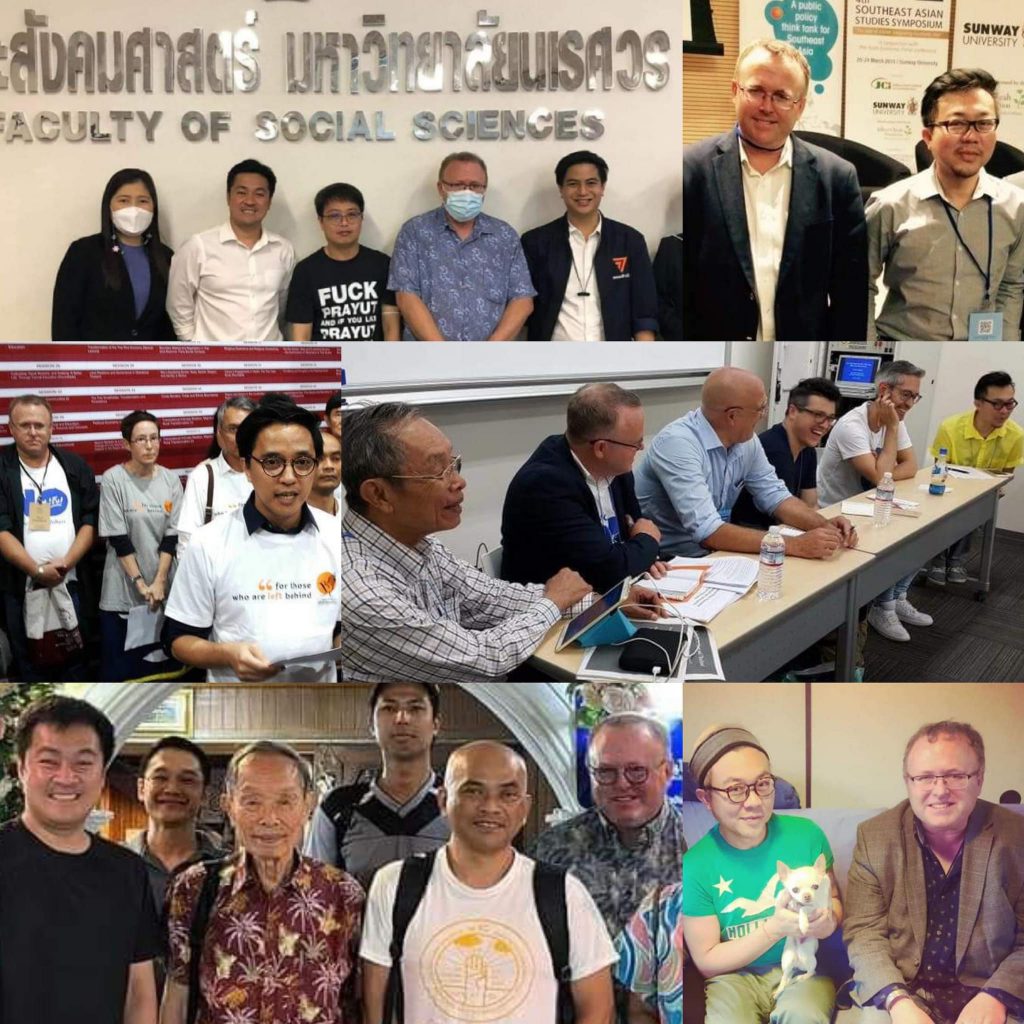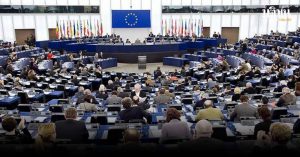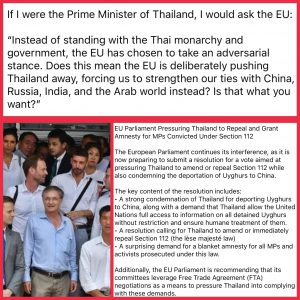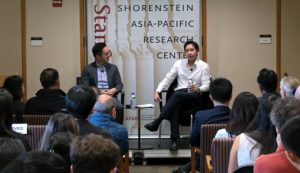
มหาวิทยาลัยนเรศวรจ้าง “พอล แชมเบอร์ส” มาบั่นทอนสถาบันพระมหากษัตริย์ หรืออย่างไร?
โดย อัษฎางค์ ยมนาค
พอล แชมเบอร์ส ระบุว่าสถาบันพระมหากษัตริย์มีบทบาทสำคัญในการควบคุมการแต่งตั้งตำแหน่งระดับสูงในกองทัพ
ดร.พอล แชมเบอร์ เป็นอาจารย์และที่ปรึกษาพิเศษด้านกิจการต่างประเทศ ของ Center of ASEAN Community Studies คณะสังคมศาสตร์ มหาวิทยาลัยนเรศวร
บทความมากมายของเขาเกี่ยวกับการมีส่วนร่วมของสถาบันกษัตริย์ กับความสัมพันธ์ระหว่างทหารและพลเรือน และระบอบประชาธิปไตยในประเทศไทย
นี่คือส่วนหนึ่งของการวิพากษ์วิจารณ์ของเขา ว่าพระมหากษัตริย์มีอำนาจทางกฎหมายมากกว่านายกรัฐมนตรีที่ได้รับการเลือกตั้งในเรื่องการปรับโครงสร้างกองทัพ ดังนี้
“เมื่อวันที่ 1 ตุลาคม 2024 ประเทศไทยได้มีการปรับเปลี่ยนผู้นำในกองทัพและตำรวจใหม่ ซึ่งการแต่งตั้งเหล่านี้มีความสำคัญอย่างยิ่ง เนื่องจากเจ้าหน้าที่ด้านความมั่นคงระดับสูงมีอำนาจผูกขาดในด้านการควบคุมอาวุธของประเทศ
รัฐบาลของนายกรัฐมนตรีแพทองธาร ชินวัตร ขาดการควบคุมกองทัพโดยพลเรือน ซึ่งตามรัฐธรรมนูญ กองทัพยังคงอยู่ภายใต้อำนาจของพระบาทสมเด็จพระเจ้าอยู่หัว โดยพระมหากษัตริย์มีอำนาจทางกฎหมายมากกว่านายกรัฐมนตรีที่ได้รับการเลือกตั้งในเรื่องการปรับโครงสร้างกองทัพ ซึ่งถือเป็นอุปสรรคสำคัญต่อกระบวนการทำให้เป็นประชาธิปไตย การปรับโครงสร้างกองทัพในปีนี้แสดงถึงความแตกแยกภายในและความตึงเครียดระหว่างความต้องการของพลเรือนและทหาร”
คำกล่าวของพอล แชมเบอร์ส ที่ว่าพระมหากษัตริย์ของไทยมีบทบาทสำคัญในการควบคุมการแต่งตั้งตำแหน่งระดับสูงในกองทัพนั้น อาจเป็นการตีความที่คลาดเคลื่อนจากกรอบกฎหมายและระบบรัฐธรรมนูญของประเทศไทย
ซึ่งเป็น ราชอาณาจักรภายใต้รัฐธรรมนูญ อำนาจในการแต่งตั้งข้าราชการทหารระดับสูง เช่น ผู้บัญชาการทหารสูงสุด หรือ ผู้บัญชาการเหล่าทัพ นั้นอยู่ภายใต้การควบคุมของ รัฐบาลและนายกรัฐมนตรี
กรอบกฎหมายและกระบวนการตามรัฐธรรมนูญ
ตามรัฐธรรมนูญของไทย นายกรัฐมนตรีและรัฐมนตรีว่าการกระทรวงกลาโหม ซึ่งเป็นนักการเมืองพลเรือน มีหน้าที่รับผิดชอบในการเสนอชื่อผู้ที่จะดำรงตำแหน่งทหารระดับสูง การเสนอชื่อเหล่านี้ต้องผ่านการอนุมัติจาก คณะรัฐมนตรี และปฏิบัติตามกระบวนการทางประชาธิปไตยที่ระบุไว้ในระบบการปกครองของไทย ขั้นตอนสุดท้ายที่พระมหากษัตริย์ ลงพระปรมาภิไธย เป็นส่วนหนึ่งของ พิธีการทางรัฐธรรมนูญ ซึ่งเป็นลักษณะสำคัญของ ราชอาณาจักรภายใต้รัฐธรรมนูญ การลงพระปรมาภิไธยนี้ไม่ได้หมายความว่าพระมหากษัตริย์ควบคุมหรือจัดการการแต่งตั้งโดยตรง แต่เป็นการยืนยันว่าการแต่งตั้งดังกล่าวปฏิบัติตามรัฐธรรมนูญ .
บทบาทของนักการเมืองในการแต่งตั้งทางทหาร
ในทางปฏิบัติ นักการเมือง โดยเฉพาะ นายกรัฐมนตรี มีบทบาทสำคัญในการแต่งตั้งตำแหน่งทหารระดับสูง โดยมีการเลือกบุคคลตามคำแนะนำและการปรึกษาจากกองทัพและ กระทรวงกลาโหม การแต่งตั้งทหารต้องสะท้อนถึงสมดุลทางอำนาจและความสามารถในกองทัพ และการลงพระปรมาภิไธยถือเป็นส่วนของพิธีการภายใต้ระบบรัฐธรรมนูญ ซึ่งไม่ใช่การแทรกแซงโดยตรงของพระมหากษัตริย์ในโครงสร้างการปฏิบัติของกองทัพ .
บทบาทที่เป็นกลางของสถาบันพระมหากษัตริย์ในทางการเมือง
สถาบันพระมหากษัตริย์ ของไทยเป็นสัญลักษณ์แห่งความเป็นเอกภาพและความต่อเนื่องของชาติ และมีบทบาทที่เป็นกลางทางการเมือง ประวัติศาสตร์ของสถาบันฯ ในการมีส่วนร่วมกับกิจการของรัฐส่วนใหญ่มีลักษณะเป็น พิธีการ และมุ่งเน้นไปที่การส่งเสริม ความสามัคคี และ ความสงบสุขของสังคม การกล่าวว่าสถาบันฯ มีบทบาทสำคัญในการควบคุมกองทัพนั้นเสี่ยงต่อการสร้างความเข้าใจผิดเกี่ยวกับบทบาทตามรัฐธรรมนูญของสถาบันฯ ซึ่งในความเป็นจริงนั้น สถาบันฯ มีบทบาทในการ ส่งเสริมความสมานฉันท์ ของชาติและรักษาความสงบสุขของสังคมมากกว่า .
ความเข้าใจผิดเกี่ยวกับคำกล่าวของแชมเบอร์ส
คำกล่าวของแชมเบอร์สที่ว่า รัฐบาลพลเรือนไม่มีอำนาจในการควบคุมกองทัพ และสถาบันพระมหากษัตริย์มีอิทธิพลโดยตรงต่อการแต่งตั้งข้าราชการทหารระดับสูงนั้น ไม่สอดคล้องกับการออกแบบระบบรัฐธรรมนูญของไทย การตีความดังกล่าวอาจทำให้เกิดความเข้าใจผิดเกี่ยวกับบทบาทของสถาบันพระมหากษัตริย์และโครงสร้างการปกครองของไทย การกล่าวว่าสถาบันฯ มีบทบาททางการเมืองโดยตรงอาจสร้างความเข้าใจผิดเกี่ยวกับบทบาทที่ ไม่แทรกแซง ของสถาบันฯ ในการดำเนินการของรัฐบาลและกองทัพ
สรุป
โดยสรุป ระบบราชอาณาจักรภายใต้รัฐธรรมนูญของไทยได้กำหนดไว้อย่างชัดเจนว่า อำนาจในการแต่งตั้งข้าราชการทหาร อยู่ภายใต้การควบคุมของ รัฐบาล และดำเนินการผ่าน กระบวนการทางรัฐธรรมนูญ แม้ว่าบทบาทของสถาบันพระมหากษัตริย์ในการลงพระปรมาภิไธยถือเป็นส่วนสำคัญของระบบ แต่การควบคุมและอำนาจในการแต่งตั้งที่แท้จริงยังคงอยู่กับ นักการเมือง เช่น นายกรัฐมนตรี และ รัฐมนตรีว่าการกระทรวงกลาโหม ดังนั้น การอ้างว่าสถาบันพระมหากษัตริย์มีอิทธิพลโดยตรงในการแต่งตั้งทางทหารจึงไม่ตรงกับความเป็นจริงตามหลักการทางรัฐธรรมนูญของประเทศไทย
คนไทย หน่วยงานความมั่นคงแห่งชาติและรัฐบาลไทย จะปล่อยให้คนต่างชาติอาศัยแผ่นดินไทย ปลุกปั่นและบั่นทอนสถาบันพระมหากษัตริย์ ซึ่งเป็นองค์พระประมุขของชาติ ไปอีกนานแค่ไหน หรือจะรอวันให้เขาล้มเจ้าสำเร็จ
มหาวิทยาลัยนเรศวร จ้างฝรั่งมาสอน หรือปลุกปั่น หรือชี้นำให้นักศึกษามองพระมหากษัตริย์อย่างบิดเบือน ด้วยจุดประสงค์ใด?
มหาวิทยาลัยนเรศวร จ้างฝรั่งเข้ามาสร้างข้อมูลบิดเบือนไปจากข้อเท็จจริง เพื่อบั่นทอนสถาบันพระมหากษัตริย์ อันจะนำไปสู่การเปลี่ยนแปลงการปกครอง หรือไม่?
มหาวิทยาลัยนเรศวร มีจุดประสงค์ซ่อนเร้นอะไรต่อสถาบันพระมหากษัตริย์และการปกครองในระบอบประชาธิปไตยอันมีพระมหากษัตริย์หรือไม่?
คนไทยและหน่วยงานของรัฐ จะปล่อยให้ มหาวิทยาลัยนเรศวรจ้างฝรั่งมาบั่นทอนสถาบันพระมหากษัตริย์ อันอาจจะนำไปสู่การเปลี่ยนแปลงการปกครอง หรือ?
Paul Chambers has asserted that the Thai monarchy plays a significant role in controlling high-ranking military appointments.
Dr. Paul Chambers is a Lecturer and Special Advisor on international affairs at the Center of ASEAN Community Studies, Faculty of Social Sciences, Naresuan University.
Much of his work focuses on the interaction between the monarchy, civil-military relations, and the democratic system in Thailand. His critiques often involve examining the influence of the monarchy on key political and military decisions.
In one of his notable arguments, Chambers claims that the monarchy wields more legal power than the elected Prime Minister when it comes to military restructuring. He has stated:
“The King, rather than the elected Prime Minister, wields more legal power over decisions regarding military reshuffles, presenting a clear impediment to the democratization process.”
This statement reflects his broader analysis of how civil-military relations in Thailand are shaped by the monarchy’s constitutional and symbolic role in the country.
”Prime Minister Paethongtarn Shinawatra’s government currently lacks civilian control over the military, which, under the constitution, remains under the authority of His Majesty the King. The King, rather than the elected Prime Minister, wields more legal power over decisions regarding military reshuffles—a clear impediment to the democratization process.“
https://www.iseas.edu.sg/mec-events/thailands-2024-military-and-police-reshuffles-what-do-they-mean/
Paul Chambers’ assertion that the Thai monarchy plays a significant role in controlling high-ranking military appointments seems to misinterpret the constitutional and legal framework of Thailand’s political system.
According to Thailand’s constitutional monarchy, the power to appoint senior military officers, such as the Commander-in-Chief of the Armed Forces or heads of the different branches of the military, lies within the authority of the government and the Prime Minister.
Legal Framework and Constitutional Process
Under the Thai constitution, the Prime Minister and the Minister of Defense, both of whom are civilian political figures, hold the responsibility for nominating candidates for high-ranking military positions. These nominations must pass through the Cabinet and follow the democratic processes outlined within Thailand’s system of government. The final stage, where the King grants royal assent by affixing his signature, is a constitutional formality—an essential part of Thailand’s system of Constitutional Monarchy. This process does not imply that the monarchy directly manages or controls these appointments but instead ensures that military appointments adhere to constitutional norms .
The Role of Politicians in Military Appointments
In practice, politicians, particularly the Prime Minister, hold the decisive role in military appointments. This role includes selecting officers based on recommendations and consultations within the armed forces and the Ministry of Defense. Military appointments must reflect the balance of power, efficiency, and strategic considerations within the armed forces. The royal endorsement is part of the ceremonial aspect of the constitutional monarchy, and it does not denote direct involvement or control by the monarchy in the military’s operational or hierarchical structure .
The Monarchy’s Neutral Role in Politics
The Thai monarchy serves as a symbol of unity and continuity for the Thai people and holds a politically neutral position. Historically, the monarchy’s involvement in state affairs has been primarily ceremonial and aligned with the values of promoting national unity and social harmony. In this light, the suggestion that the monarchy actively controls military affairs risks misrepresenting the institution’s constitutional role. Instead, the monarchy’s role is to maintain the integrity of the political and military processes through its symbolic authority .
Misinterpretations of Chambers’ Claim
Chambers’ claim that the civilian government lacks control over the military and that the monarchy exercises direct influence over military appointments does not align with Thailand’s constitutional design. Such interpretations could lead to misconceptions about the role of the monarchy and political structures in Thailand. The suggestion that the monarchy plays an active role in decision-making processes related to military appointments can undermine the understanding of the monarchy’s apolitical and unifying function in the country.
Conclusion
In conclusion, the framework of Thailand’s constitutional monarchy clearly outlines that the power of military appointments rests with the government and is executed through democratic and constitutional processes. While the monarchy’s involvement in ceremonial aspects of the process is an integral part of Thailand’s system, the real authority and control lie with the political figures in power, such as the Prime Minister and Minister of Defense. As such, any claim that the monarchy directly controls military appointments misrepresents the constitutional and political realities of Thailand.



